7QQMM307 Self-Reflection Essay: Social and Sustainable Enterprise
VerifiedAdded on 2022/09/17
|7
|1702
|27
Essay
AI Summary
This essay provides a detailed self-reflection analysis of a student's skills, motivation, and potential for developing and leading a nonprofit social enterprise. The essay is based on self-assessments and reflections, drawing upon concepts like Schwartz's value theory, the Gibb's reflective cycle, and Bandura's self-efficacy theory. It explores the student's strengths, such as communication and research skills, and weaknesses, like time management and IT knowledge. The student identifies opportunities in the market and outlines plans for personal and skill development to become a successful social entrepreneur. The essay demonstrates an understanding of how personal values, beliefs, and experiences influence entrepreneurial behavior and effectiveness. The student also reflects on key abilities needed in the employability industry and discusses how various tools and frameworks can contribute to competence development.

Self-Reflection
Student Details
8/27/2019
Student Details
8/27/2019
Paraphrase This Document
Need a fresh take? Get an instant paraphrase of this document with our AI Paraphraser
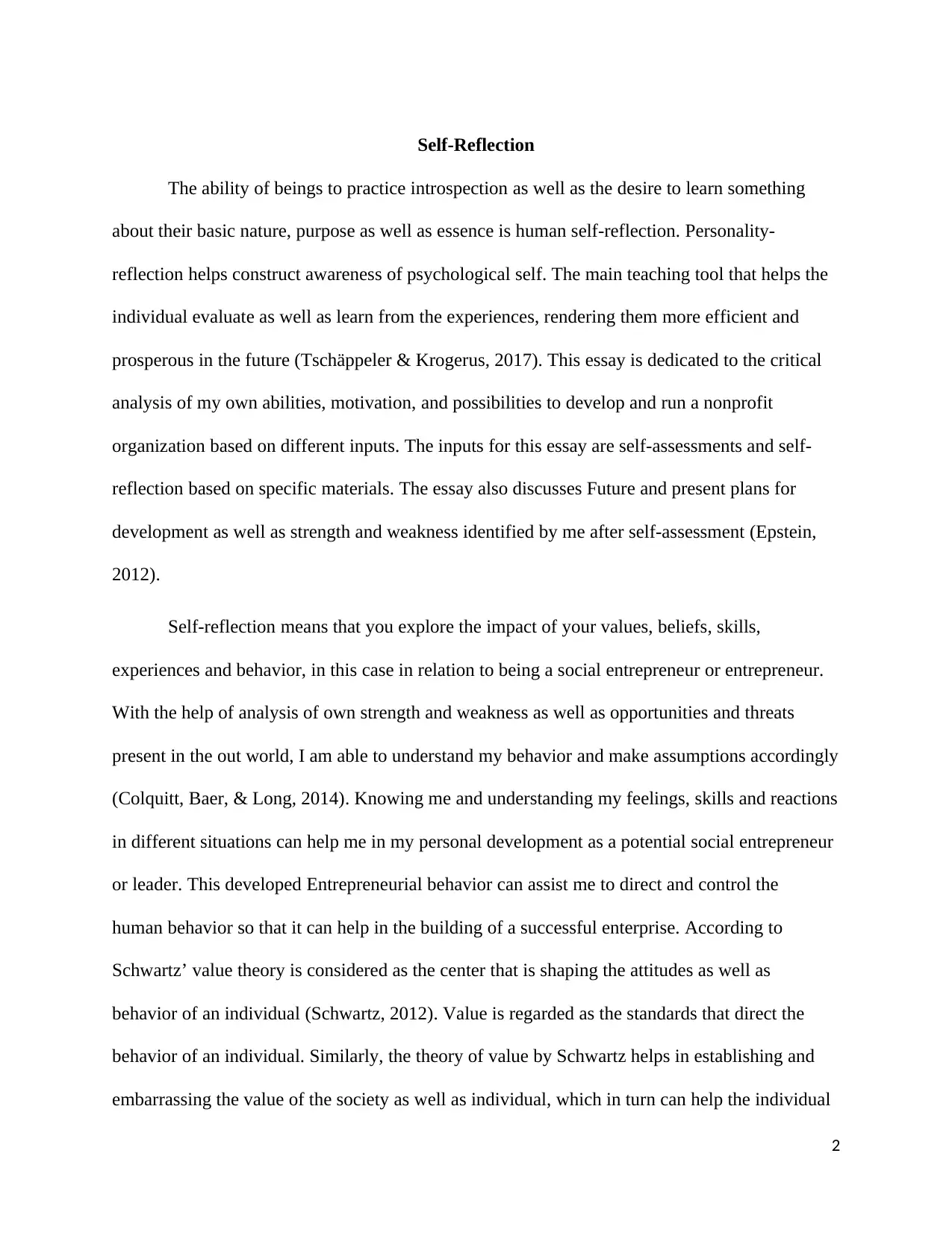
Self-Reflection
The ability of beings to practice introspection as well as the desire to learn something
about their basic nature, purpose as well as essence is human self-reflection. Personality-
reflection helps construct awareness of psychological self. The main teaching tool that helps the
individual evaluate as well as learn from the experiences, rendering them more efficient and
prosperous in the future (Tschäppeler & Krogerus, 2017). This essay is dedicated to the critical
analysis of my own abilities, motivation, and possibilities to develop and run a nonprofit
organization based on different inputs. The inputs for this essay are self-assessments and self-
reflection based on specific materials. The essay also discusses Future and present plans for
development as well as strength and weakness identified by me after self-assessment (Epstein,
2012).
Self-reflection means that you explore the impact of your values, beliefs, skills,
experiences and behavior, in this case in relation to being a social entrepreneur or entrepreneur.
With the help of analysis of own strength and weakness as well as opportunities and threats
present in the out world, I am able to understand my behavior and make assumptions accordingly
(Colquitt, Baer, & Long, 2014). Knowing me and understanding my feelings, skills and reactions
in different situations can help me in my personal development as a potential social entrepreneur
or leader. This developed Entrepreneurial behavior can assist me to direct and control the
human behavior so that it can help in the building of a successful enterprise. According to
Schwartz’ value theory is considered as the center that is shaping the attitudes as well as
behavior of an individual (Schwartz, 2012). Value is regarded as the standards that direct the
behavior of an individual. Similarly, the theory of value by Schwartz helps in establishing and
embarrassing the value of the society as well as individual, which in turn can help the individual
2
The ability of beings to practice introspection as well as the desire to learn something
about their basic nature, purpose as well as essence is human self-reflection. Personality-
reflection helps construct awareness of psychological self. The main teaching tool that helps the
individual evaluate as well as learn from the experiences, rendering them more efficient and
prosperous in the future (Tschäppeler & Krogerus, 2017). This essay is dedicated to the critical
analysis of my own abilities, motivation, and possibilities to develop and run a nonprofit
organization based on different inputs. The inputs for this essay are self-assessments and self-
reflection based on specific materials. The essay also discusses Future and present plans for
development as well as strength and weakness identified by me after self-assessment (Epstein,
2012).
Self-reflection means that you explore the impact of your values, beliefs, skills,
experiences and behavior, in this case in relation to being a social entrepreneur or entrepreneur.
With the help of analysis of own strength and weakness as well as opportunities and threats
present in the out world, I am able to understand my behavior and make assumptions accordingly
(Colquitt, Baer, & Long, 2014). Knowing me and understanding my feelings, skills and reactions
in different situations can help me in my personal development as a potential social entrepreneur
or leader. This developed Entrepreneurial behavior can assist me to direct and control the
human behavior so that it can help in the building of a successful enterprise. According to
Schwartz’ value theory is considered as the center that is shaping the attitudes as well as
behavior of an individual (Schwartz, 2012). Value is regarded as the standards that direct the
behavior of an individual. Similarly, the theory of value by Schwartz helps in establishing and
embarrassing the value of the society as well as individual, which in turn can help the individual
2
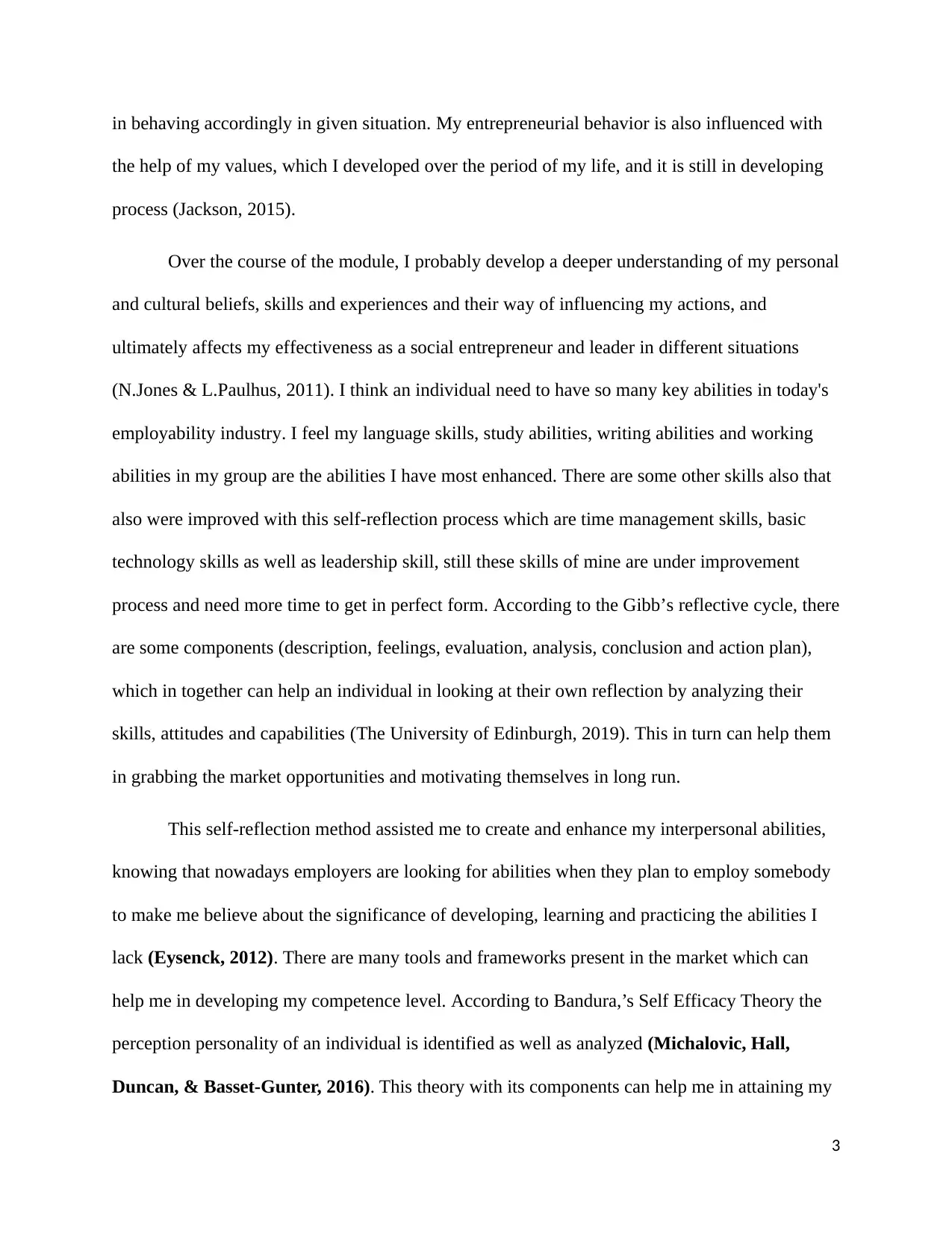
in behaving accordingly in given situation. My entrepreneurial behavior is also influenced with
the help of my values, which I developed over the period of my life, and it is still in developing
process (Jackson, 2015).
Over the course of the module, I probably develop a deeper understanding of my personal
and cultural beliefs, skills and experiences and their way of influencing my actions, and
ultimately affects my effectiveness as a social entrepreneur and leader in different situations
(N.Jones & L.Paulhus, 2011). I think an individual need to have so many key abilities in today's
employability industry. I feel my language skills, study abilities, writing abilities and working
abilities in my group are the abilities I have most enhanced. There are some other skills also that
also were improved with this self-reflection process which are time management skills, basic
technology skills as well as leadership skill, still these skills of mine are under improvement
process and need more time to get in perfect form. According to the Gibb’s reflective cycle, there
are some components (description, feelings, evaluation, analysis, conclusion and action plan),
which in together can help an individual in looking at their own reflection by analyzing their
skills, attitudes and capabilities (The University of Edinburgh, 2019). This in turn can help them
in grabbing the market opportunities and motivating themselves in long run.
This self-reflection method assisted me to create and enhance my interpersonal abilities,
knowing that nowadays employers are looking for abilities when they plan to employ somebody
to make me believe about the significance of developing, learning and practicing the abilities I
lack (Eysenck, 2012). There are many tools and frameworks present in the market which can
help me in developing my competence level. According to Bandura,’s Self Efficacy Theory the
perception personality of an individual is identified as well as analyzed (Michalovic, Hall,
Duncan, & Basset-Gunter, 2016). This theory with its components can help me in attaining my
3
the help of my values, which I developed over the period of my life, and it is still in developing
process (Jackson, 2015).
Over the course of the module, I probably develop a deeper understanding of my personal
and cultural beliefs, skills and experiences and their way of influencing my actions, and
ultimately affects my effectiveness as a social entrepreneur and leader in different situations
(N.Jones & L.Paulhus, 2011). I think an individual need to have so many key abilities in today's
employability industry. I feel my language skills, study abilities, writing abilities and working
abilities in my group are the abilities I have most enhanced. There are some other skills also that
also were improved with this self-reflection process which are time management skills, basic
technology skills as well as leadership skill, still these skills of mine are under improvement
process and need more time to get in perfect form. According to the Gibb’s reflective cycle, there
are some components (description, feelings, evaluation, analysis, conclusion and action plan),
which in together can help an individual in looking at their own reflection by analyzing their
skills, attitudes and capabilities (The University of Edinburgh, 2019). This in turn can help them
in grabbing the market opportunities and motivating themselves in long run.
This self-reflection method assisted me to create and enhance my interpersonal abilities,
knowing that nowadays employers are looking for abilities when they plan to employ somebody
to make me believe about the significance of developing, learning and practicing the abilities I
lack (Eysenck, 2012). There are many tools and frameworks present in the market which can
help me in developing my competence level. According to Bandura,’s Self Efficacy Theory the
perception personality of an individual is identified as well as analyzed (Michalovic, Hall,
Duncan, & Basset-Gunter, 2016). This theory with its components can help me in attaining my
3
⊘ This is a preview!⊘
Do you want full access?
Subscribe today to unlock all pages.

Trusted by 1+ million students worldwide
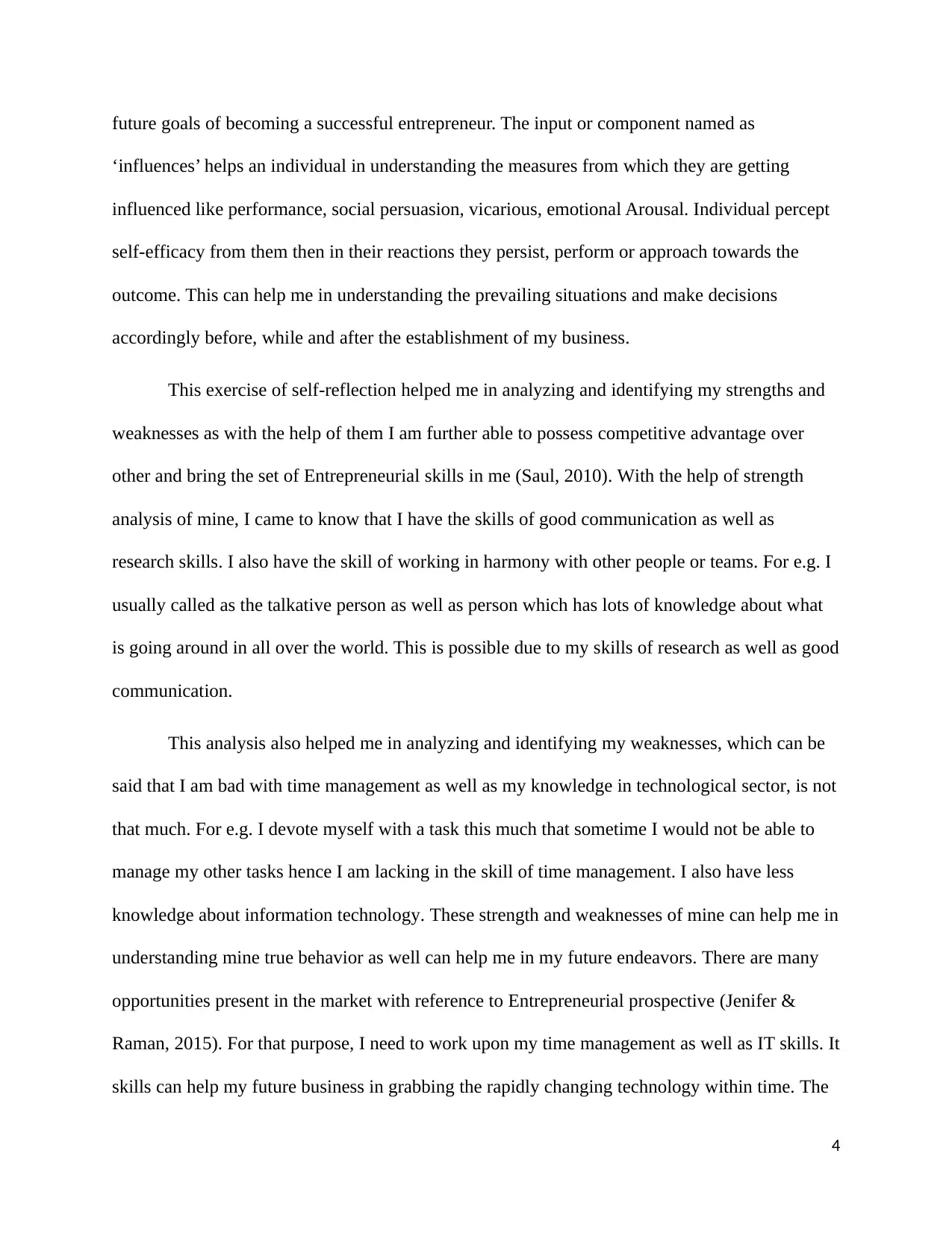
future goals of becoming a successful entrepreneur. The input or component named as
‘influences’ helps an individual in understanding the measures from which they are getting
influenced like performance, social persuasion, vicarious, emotional Arousal. Individual percept
self-efficacy from them then in their reactions they persist, perform or approach towards the
outcome. This can help me in understanding the prevailing situations and make decisions
accordingly before, while and after the establishment of my business.
This exercise of self-reflection helped me in analyzing and identifying my strengths and
weaknesses as with the help of them I am further able to possess competitive advantage over
other and bring the set of Entrepreneurial skills in me (Saul, 2010). With the help of strength
analysis of mine, I came to know that I have the skills of good communication as well as
research skills. I also have the skill of working in harmony with other people or teams. For e.g. I
usually called as the talkative person as well as person which has lots of knowledge about what
is going around in all over the world. This is possible due to my skills of research as well as good
communication.
This analysis also helped me in analyzing and identifying my weaknesses, which can be
said that I am bad with time management as well as my knowledge in technological sector, is not
that much. For e.g. I devote myself with a task this much that sometime I would not be able to
manage my other tasks hence I am lacking in the skill of time management. I also have less
knowledge about information technology. These strength and weaknesses of mine can help me in
understanding mine true behavior as well can help me in my future endeavors. There are many
opportunities present in the market with reference to Entrepreneurial prospective (Jenifer &
Raman, 2015). For that purpose, I need to work upon my time management as well as IT skills. It
skills can help my future business in grabbing the rapidly changing technology within time. The
4
‘influences’ helps an individual in understanding the measures from which they are getting
influenced like performance, social persuasion, vicarious, emotional Arousal. Individual percept
self-efficacy from them then in their reactions they persist, perform or approach towards the
outcome. This can help me in understanding the prevailing situations and make decisions
accordingly before, while and after the establishment of my business.
This exercise of self-reflection helped me in analyzing and identifying my strengths and
weaknesses as with the help of them I am further able to possess competitive advantage over
other and bring the set of Entrepreneurial skills in me (Saul, 2010). With the help of strength
analysis of mine, I came to know that I have the skills of good communication as well as
research skills. I also have the skill of working in harmony with other people or teams. For e.g. I
usually called as the talkative person as well as person which has lots of knowledge about what
is going around in all over the world. This is possible due to my skills of research as well as good
communication.
This analysis also helped me in analyzing and identifying my weaknesses, which can be
said that I am bad with time management as well as my knowledge in technological sector, is not
that much. For e.g. I devote myself with a task this much that sometime I would not be able to
manage my other tasks hence I am lacking in the skill of time management. I also have less
knowledge about information technology. These strength and weaknesses of mine can help me in
understanding mine true behavior as well can help me in my future endeavors. There are many
opportunities present in the market with reference to Entrepreneurial prospective (Jenifer &
Raman, 2015). For that purpose, I need to work upon my time management as well as IT skills. It
skills can help my future business in grabbing the rapidly changing technology within time. The
4
Paraphrase This Document
Need a fresh take? Get an instant paraphrase of this document with our AI Paraphraser
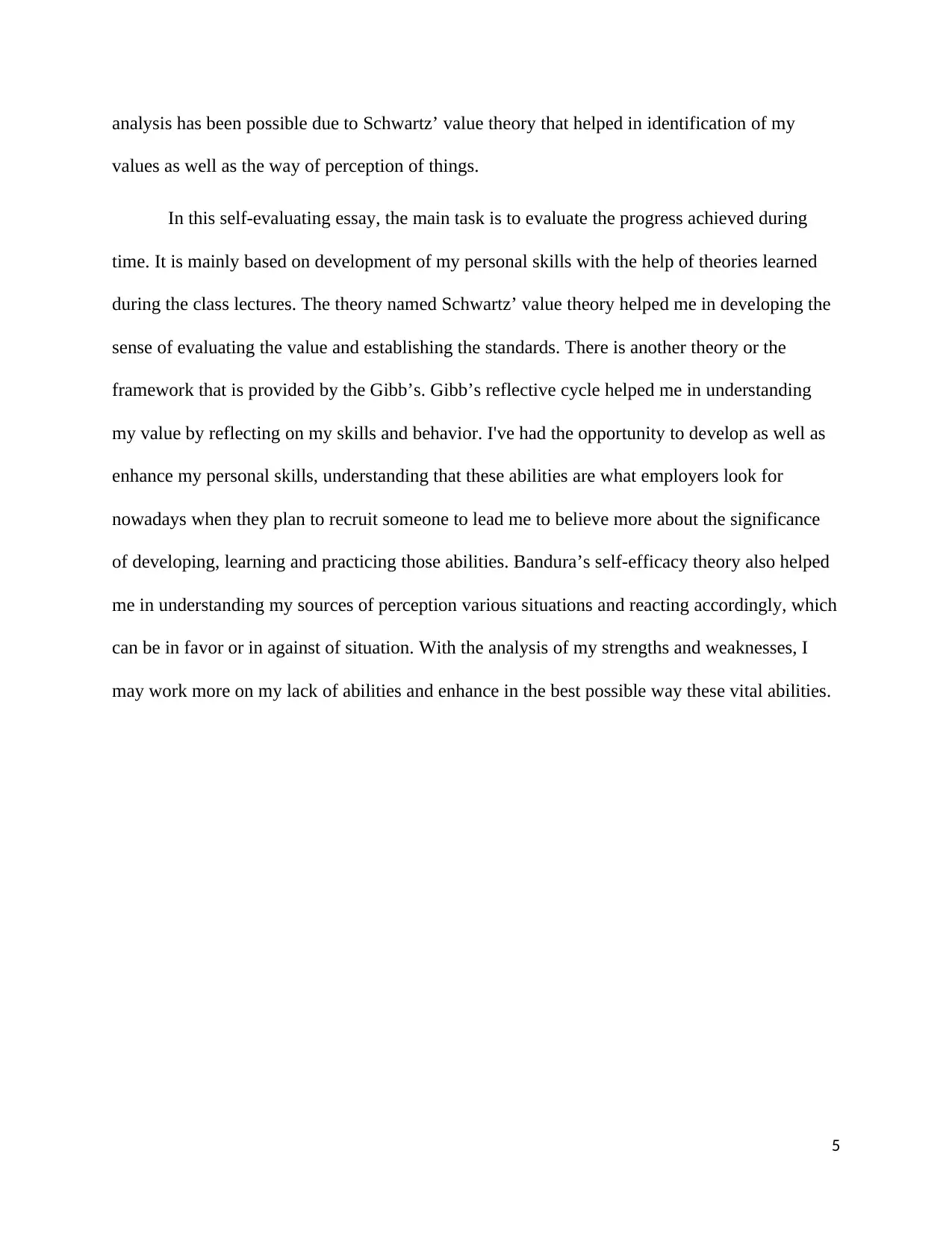
analysis has been possible due to Schwartz’ value theory that helped in identification of my
values as well as the way of perception of things.
In this self-evaluating essay, the main task is to evaluate the progress achieved during
time. It is mainly based on development of my personal skills with the help of theories learned
during the class lectures. The theory named Schwartz’ value theory helped me in developing the
sense of evaluating the value and establishing the standards. There is another theory or the
framework that is provided by the Gibb’s. Gibb’s reflective cycle helped me in understanding
my value by reflecting on my skills and behavior. I've had the opportunity to develop as well as
enhance my personal skills, understanding that these abilities are what employers look for
nowadays when they plan to recruit someone to lead me to believe more about the significance
of developing, learning and practicing those abilities. Bandura’s self-efficacy theory also helped
me in understanding my sources of perception various situations and reacting accordingly, which
can be in favor or in against of situation. With the analysis of my strengths and weaknesses, I
may work more on my lack of abilities and enhance in the best possible way these vital abilities.
5
values as well as the way of perception of things.
In this self-evaluating essay, the main task is to evaluate the progress achieved during
time. It is mainly based on development of my personal skills with the help of theories learned
during the class lectures. The theory named Schwartz’ value theory helped me in developing the
sense of evaluating the value and establishing the standards. There is another theory or the
framework that is provided by the Gibb’s. Gibb’s reflective cycle helped me in understanding
my value by reflecting on my skills and behavior. I've had the opportunity to develop as well as
enhance my personal skills, understanding that these abilities are what employers look for
nowadays when they plan to recruit someone to lead me to believe more about the significance
of developing, learning and practicing those abilities. Bandura’s self-efficacy theory also helped
me in understanding my sources of perception various situations and reacting accordingly, which
can be in favor or in against of situation. With the analysis of my strengths and weaknesses, I
may work more on my lack of abilities and enhance in the best possible way these vital abilities.
5
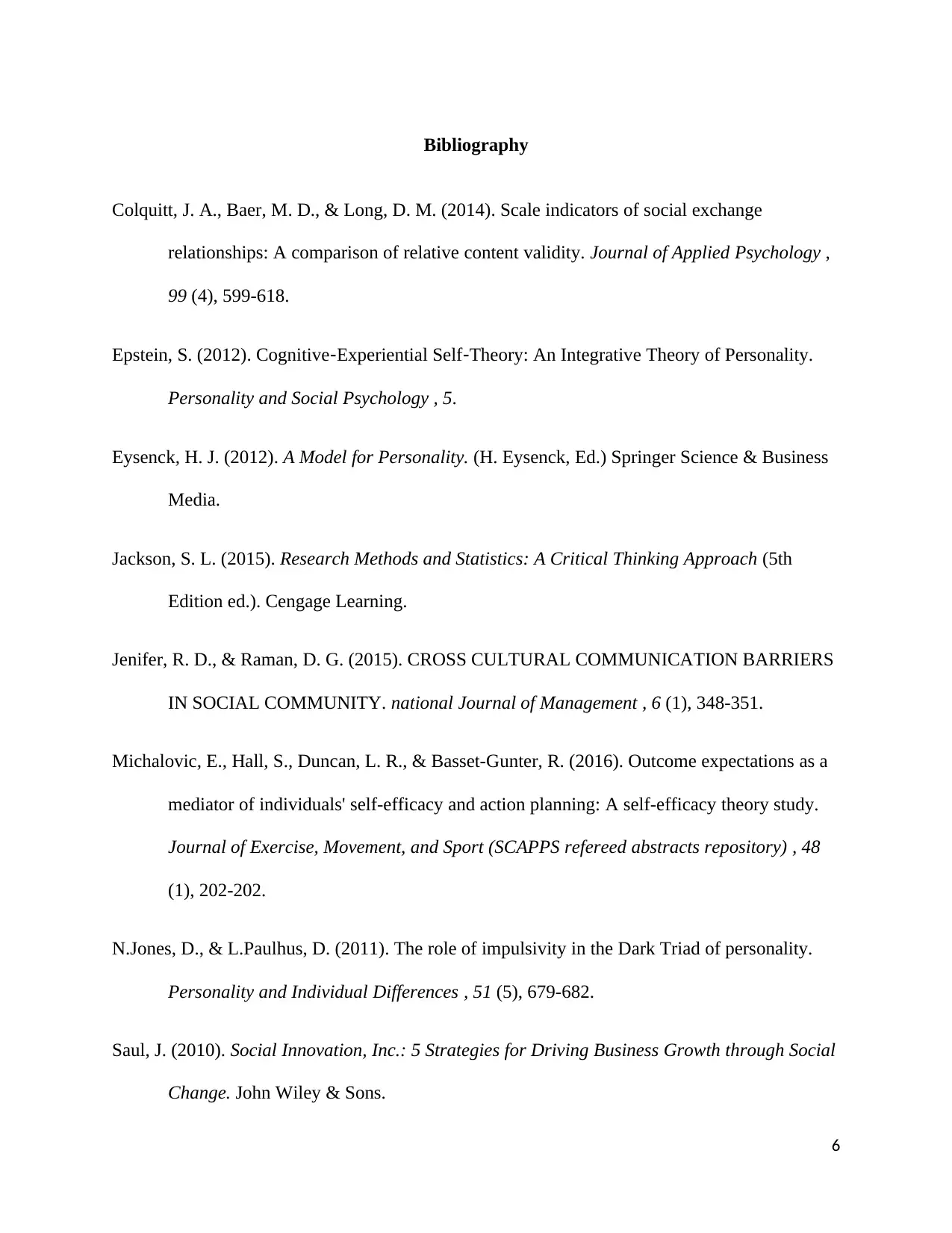
Bibliography
Colquitt, J. A., Baer, M. D., & Long, D. M. (2014). Scale indicators of social exchange
relationships: A comparison of relative content validity. Journal of Applied Psychology ,
99 (4), 599-618.
Epstein, S. (2012). Cognitive‐Experiential Self‐Theory: An Integrative Theory of Personality.
Personality and Social Psychology , 5.
Eysenck, H. J. (2012). A Model for Personality. (H. Eysenck, Ed.) Springer Science & Business
Media.
Jackson, S. L. (2015). Research Methods and Statistics: A Critical Thinking Approach (5th
Edition ed.). Cengage Learning.
Jenifer, R. D., & Raman, D. G. (2015). CROSS CULTURAL COMMUNICATION BARRIERS
IN SOCIAL COMMUNITY. national Journal of Management , 6 (1), 348-351.
Michalovic, E., Hall, S., Duncan, L. R., & Basset-Gunter, R. (2016). Outcome expectations as a
mediator of individuals' self-efficacy and action planning: A self-efficacy theory study.
Journal of Exercise, Movement, and Sport (SCAPPS refereed abstracts repository) , 48
(1), 202-202.
N.Jones, D., & L.Paulhus, D. (2011). The role of impulsivity in the Dark Triad of personality.
Personality and Individual Differences , 51 (5), 679-682.
Saul, J. (2010). Social Innovation, Inc.: 5 Strategies for Driving Business Growth through Social
Change. John Wiley & Sons.
6
Colquitt, J. A., Baer, M. D., & Long, D. M. (2014). Scale indicators of social exchange
relationships: A comparison of relative content validity. Journal of Applied Psychology ,
99 (4), 599-618.
Epstein, S. (2012). Cognitive‐Experiential Self‐Theory: An Integrative Theory of Personality.
Personality and Social Psychology , 5.
Eysenck, H. J. (2012). A Model for Personality. (H. Eysenck, Ed.) Springer Science & Business
Media.
Jackson, S. L. (2015). Research Methods and Statistics: A Critical Thinking Approach (5th
Edition ed.). Cengage Learning.
Jenifer, R. D., & Raman, D. G. (2015). CROSS CULTURAL COMMUNICATION BARRIERS
IN SOCIAL COMMUNITY. national Journal of Management , 6 (1), 348-351.
Michalovic, E., Hall, S., Duncan, L. R., & Basset-Gunter, R. (2016). Outcome expectations as a
mediator of individuals' self-efficacy and action planning: A self-efficacy theory study.
Journal of Exercise, Movement, and Sport (SCAPPS refereed abstracts repository) , 48
(1), 202-202.
N.Jones, D., & L.Paulhus, D. (2011). The role of impulsivity in the Dark Triad of personality.
Personality and Individual Differences , 51 (5), 679-682.
Saul, J. (2010). Social Innovation, Inc.: 5 Strategies for Driving Business Growth through Social
Change. John Wiley & Sons.
6
⊘ This is a preview!⊘
Do you want full access?
Subscribe today to unlock all pages.

Trusted by 1+ million students worldwide
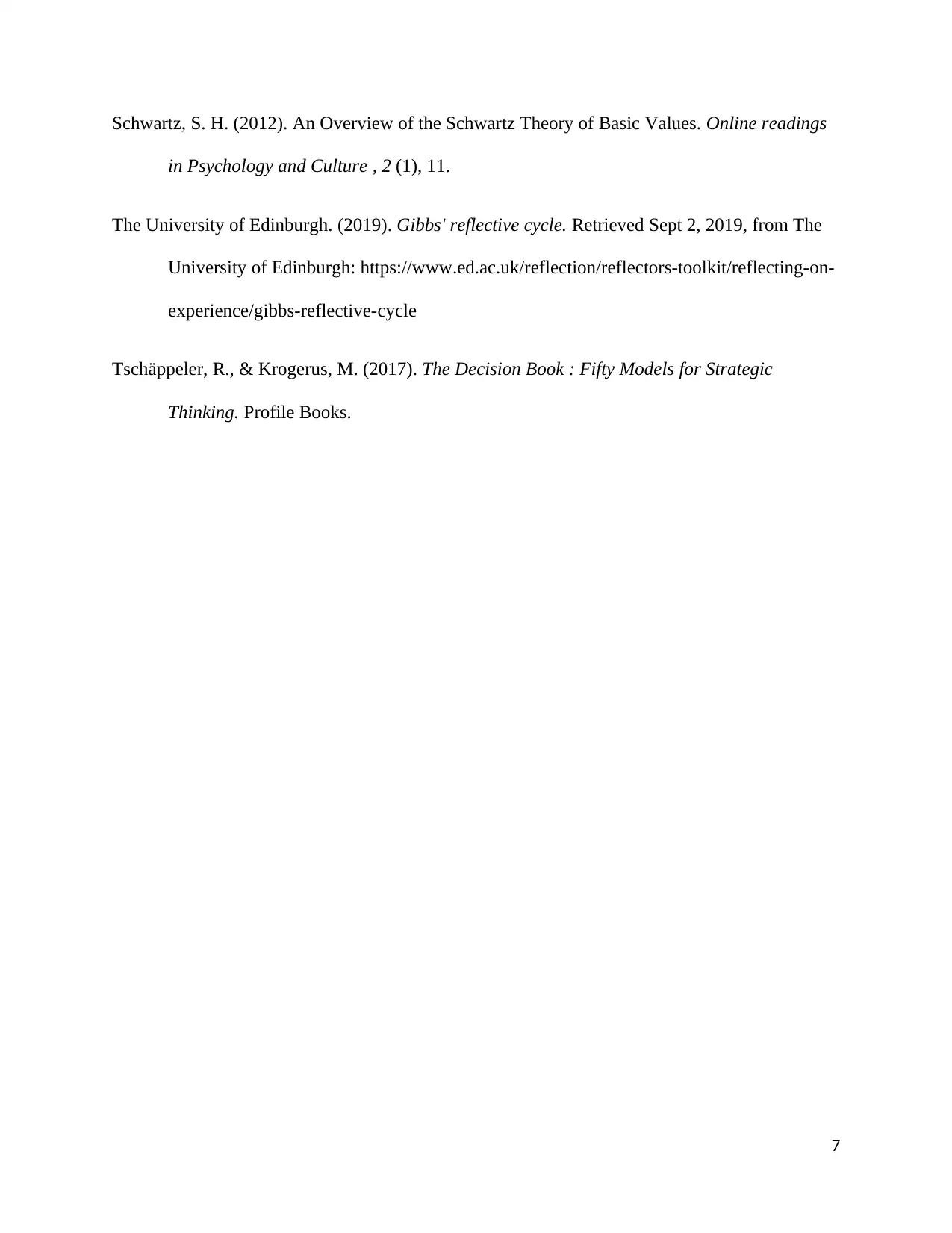
Schwartz, S. H. (2012). An Overview of the Schwartz Theory of Basic Values. Online readings
in Psychology and Culture , 2 (1), 11.
The University of Edinburgh. (2019). Gibbs' reflective cycle. Retrieved Sept 2, 2019, from The
University of Edinburgh: https://www.ed.ac.uk/reflection/reflectors-toolkit/reflecting-on-
experience/gibbs-reflective-cycle
Tschäppeler, R., & Krogerus, M. (2017). The Decision Book : Fifty Models for Strategic
Thinking. Profile Books.
7
in Psychology and Culture , 2 (1), 11.
The University of Edinburgh. (2019). Gibbs' reflective cycle. Retrieved Sept 2, 2019, from The
University of Edinburgh: https://www.ed.ac.uk/reflection/reflectors-toolkit/reflecting-on-
experience/gibbs-reflective-cycle
Tschäppeler, R., & Krogerus, M. (2017). The Decision Book : Fifty Models for Strategic
Thinking. Profile Books.
7
1 out of 7
Related Documents
Your All-in-One AI-Powered Toolkit for Academic Success.
+13062052269
info@desklib.com
Available 24*7 on WhatsApp / Email
![[object Object]](/_next/static/media/star-bottom.7253800d.svg)
Unlock your academic potential
Copyright © 2020–2026 A2Z Services. All Rights Reserved. Developed and managed by ZUCOL.





